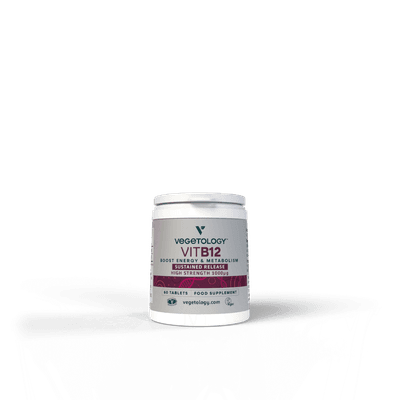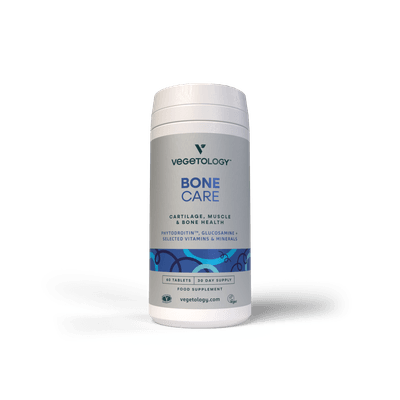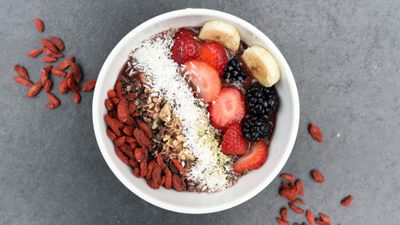

Latest Articles
There’s no doubt about it, a healthy balanced diet, whether it’s vegan, vegetarian or a diet that includes meat, is one that should give you all the essential vitamins and minerals that you need to keep you healthy.
Healthy balanced diet? If only it was that simple right?
There’s no doubt about it, a healthy balanced diet, whether it’s vegan, vegetarian or a diet that includes meat, is one that should give you all the essential vitamins and minerals that you need to keep you healthy.
For every one of us that has the perfectly balanced diet, there’s bound to be at least ten of us who don’t…. Let’s face it, we all lead busy lives and often food is grabbed on the go or we might buy pre prepared meals from the supermarket because it’s a quick, easy and often super tasty option at the end of a long day.
Vitamin A has a multitude of benefits including keeping your skin healthy, it helps boost and maintain your immune system and is also responsible for allowing your eyes to be able to see in low light conditions.
Luckily Vitamin A is readily available in a healthy balanced diet and can be easily found in:
• Dairy foods such as milk, cheese and yoghurts
• Eggs
• Oily fish
• Liver
Even better news is that food containing beta carotene can up your Vitamin A levels!
Beta Carotene is converted into Vitamin A and can be found in brightly coloured fruit and vegetables such as:
• Carrots (not such an old wives tale after all about carrots helping you to see in the dark!)
• Leafy green vegetables like spinach and broccoli
• Sweet Peppers
• Sweet Potatoes
• Mangoes
• Apricots
The Department of Health (UK) recommends that all children between the ages of six months and five years take a supplement containing vitamins A, C and D. (1) It also cautions that although liver is an excellent source of Vitamin A it, or any liver products should not be eaten more than once a week. Women who are pregnant or who are trying to conceive are advised against taking Vitamin A supplements or eating liver or liver products.

26 vitamins & minerals + superfood complex
Balance body and mind with our MultiVit, a combination of 26 vitamins and minerals plus our antioxidant "superfood" complex that provide the key nutrients often missing from a vegan or vegetarian diet. This unique formula also includes amino acid chelates, enabling superior absorption and bioactivity of each nutrient in the body.
Vitamin B1 (Thiamine)
Thiamine is found in lots of our everyday foods and helps keep our nervous systems healthy. It also works in harmony with other B vitamins to break down and release energy from food.
Thiamine can be found in:
• Fresh and dried fruits
• Vegetables
• Whole Grain bread
• Eggs
• Liver
Thiamine is also frequently used to fortify some foods such as breakfast cereal and bread.
Vitamin B2 (Riboflavin)
Again, Riboflavin is an easy to source vitamin in a healthy balanced diet. Like Thiamine, it also helps keep our nervous systems healthy as well as releasing energy from food. It’s also utilised in keeping our eyes and skin healthy.
Riboflavin is found in:
• Eggs
• Milk
• Rice
• Fortified foods
Vitamin B3 (Niacin)
There are two ‘types’ of Niacin (nicotinic acid and nicotinamide) and both of these are readily found in our food. Vitamin B3 helps maintain our nervous system and skin, plus it acts with the other B vitamins to help release energy from our food.
Niacin can be found in:
• Milk
• Eggs
• Meat
• Fish
• Wheat Flour
Vitamin B5 ((Pantothenic Acid)
Pantothenic acid is again really easy to source in our diets and is found in a variety of foods. It works alongside the other B vitamins to help release energy from food.
You can find Pantothenic Acid in:
• Fortified foods
• Eggs
• Broccoli
• Tomatoes
• Chicken
• Beef
• Kidney
Vitamin B6 ((Pyridoxine)
Vitamin B6 plays a vital role in our blood supply by helping to form haemoglobin. Haemoglobin is the part of our red blood cells that is responsible for carrying oxygen around the body. It also helps the body store energy from foods that contain carbohydrates and protein.
Luckily, seeing as how it does such an important task, there are lots of foods that are rich in Vitamin B6!
• Milk
• Eggs
• Bread
• Fish
• Chicken and Turkey
• Pork
• Brown Rice
• Potatoes
• Vegetables
• Peanuts
• Oatmeal
• Soya Beans
• Fortified Foods
• Oats
Vitamin B7 (Biotin)
Although our bodies only need a tiny amount of this, Biotin is essential as it has the job of metabolising fats.
Biotin is present in:
• Eggs
• Almonds
• Meat
• Legumes (such as peas, beans and peanuts)

Selected vitamins, minerals + Adaptogenic herbs
Looking for a caffeine-free energy boost? Active Energy combines energy-yielding Vitamin B2, B3, B5, B6, B12, Vitamin C, Folate and Iron with Adaptogenic herbs used in traditional medicines to help fight fatigue, providing support for unforgiving work schedules and hectic lifestyles.
Vitamin B9 (Folic Acid)
Almost all women will have heard of Folic acid and of its importance. Folic acid is hugely important for a developing baby in the womb and can significantly reduce the risk of spina bifida. Although folic acid is present in foods such as leafy green vegetables and brown rice as well as being added to many fortified foods, The Department of Health (UK) strongly recommends that women who are trying to conceive should take a folic acid supplement of 400mcg per day and continue this through the first trimester of her pregnancy.

20+ vitamins & minerals with folate & Vit D3
From conception planning to breastfeeding Baby, our Pregnancy Care multivitamin has been scientifically formulated to provide support through every stage of pregnancy. Each tablet is packed with nutrients for Mum and Baby, including 400μg of Folate, a dose of Vitamin D3 and more than 20 other vitamins and minerals.
Vitamin B12 (Cobalamin)
Everyone benefits from and needs Vitamin B12 as it’s essential for the formation of red blood cells. It supports the brain and nervous system plus it supports the immune system and energy levels. Vitamin B12 also has an important job in processing Folic acid.
Good sources of Vitamin B12 are:
• Meat
• Fish
• Milk
• Cheese
• Eggs
• Fortified foods
Unfortunately, for vegans and vegetarians, Vitamin B12 isn’t as readily available to them in their diet as it is to meat eaters and so people who follow a non-meat and non dairy diet should supplement their Vitamin B12 intake to avoid Vitamin B12 deficiency anaemia.

A boost for your body's core functions our vegan-friendly Vit B12 has been scientifically formulated for prolonged performance by increasing energy-yielding metabolism whilst reducing tiredness and fatigue. Using an elevated level of water-soluble Vitamin B12 in the form of Cyanocobalamin, the supplement is released gently over time to provide long-lasting benefits over 4-8 hours.
Vitamin C
Probably one of the best known of the vitamins, we bet you can’t think about Vitamin C without thinking of a deliciously juicy orange? Vitamin C is vital in the production of collagen and without it, this collagen can’t be replaced. In turn, this can lead to various tissues in the body breaking down; the first symptoms of scurvy! We’ve all heard the infamous stories of sailors suffering from scurvy because of a lack of fresh fruit and vegetables during long sea voyages, but, did you know that scurvy isn’t a thing of the past? Our bodies cannot produce Vitamin C, so even now in the 21st century, anyone who doesn’t have a balanced diet can be susceptible to scurvy.
Vitamin C is found in abundance in the following fruits and vegetables:
• Oranges
• Lemons
• Limes
• Grapefruit
• Strawberries
• Broccoli
• Peppers
The Department of Health (UK) recommends that all children between the ages of six months and five years take a supplement containing vitamins A, C and D.
Vitamin D
Vitamin D is vital to the process of calcium and phosphate absorption, both of which are essential to the health and strength of our bones, teeth and muscle. A lack or deficiency in Vitamin D can cause rickets in young children whose bones are still developing or a condition in adults called osteomalacia. Again, Vitamin D is one of the essential vitamins we need but, it’s not one that we can get any great amount of from our diets!
Some dietary sources of Vitamin D are:
• Oily Fish
• Egg Yolks
• Some red meats
• Liver
• Fortified Foods
So, how else do we get Vitamin D?
In simplistic terms, our bodies create Vitamin D when our skin is exposed to the sun. Here in the UK we should be able to create enough Vitamin D from exposing our skin to the sun (without sunscreen) for short periods between late spring and late summer, but, in the winter we just don’t get enough sunshine to be able to create Vitamin D. This is such a concern that The Department of Health (UK) recommend that Vitamin D supplements are taken by the following groups;
• Breastfed babies from birth up until one year old should have a supplement of 8.5 -10mcg (By law all formula milk is fortified with Vitamin D) (6)
• Children aged between one and 14 should have a supplement of 10 mcg daily
• People who are housebound, live in a care home or spend little regular time out of doors should take 10mcg per day
Vitamin E
Much loved by the beauty industry, Vitamin E is lauded for its antioxidant properties. Vitamin E is essential to maintaining healthy skin, eyes and helps the immune system stay healthy. Unless following an ultra low fat diet we normally get enough Vitamin E through the foods we eat. Our bodies are also clever enough to be able to store ‘reserves’ of Vitamin E, so we don’t need to consume it daily.
Some excellent sources of Vitamin E are:
• Vegetable and plant oils
• Wheat germ
• Nuts
• Seeds
• Avocado
Vitamin K1
Vitamin K is important for bone health and has a vital role in helping our blood clot effectively and allowing wounds to heal. Newborn babies have very low levels of Vitamin K and in the UK all new mums have the option of their baby having a Vitamin K injection to prevent a condition called Vitamin K Deficiency Bleeding (VKBD). Vitamin K is easily gained from a well balanced and varied diet and any excess is stored in the liver, meaning that we don’t need to eat foods containing it on a daily basis.
Vitamin K can be found in:
• Leafy green vegetables
• Vegetable oils
• Green vegetables
Vitamin K2
Vitamin K2 as a supplement is relatively new to the market and only just beginning to make a name for itself here. It’s well known in Japan and is found in a dish made from fermented soybeans called natto. You’re probably aware that the heart disease and bone problems are really low in Japan and now we think that’s because of the heightened K2 in their diet. When put together with Calcium, Vitamin K2 actually aids absorption of the calcium meaning that it doesn’t clog the arteries. If we then add Vitamin D3 to that mix you now have what we call the triangle effect! These three components are a perfect combination for your joints to ensure everything gets absorbed and allows the calcium to be utilised by the bones effectively.

Phytodroitin™, Glucosamine + selected vitamins & minerals
Give your bones a health boost with our unique blend of Phytodroitin™, Glucosamine + Selected Vitamins & Minerals including Calcium, Magnesium and Vitamins C, D3 & K2.
Calcium
Like most of us you were probably told to drink up your milk as “it was good for your bones’ ‘. Well, it’s true, milk does contain calcium and calcium is a major component in building strong, healthy teeth and bones. Calcium isn’t just vital to our bone building structure though, it also plays a significant role in the regulation of the heart muscles making sure that the heart is able to contract and pump blood around the body. Alongside Vitamin K, Calcium also ensures that our blood manages to clot correctly. Calcium is abundantly available in a healthy, well balanced diet, but a lack of calcium in developing babies can cause rickets, or in adults lead to osteoporosis.
Good sources of calcium are:
• Milk
• Cheese
• Yoghurt
• Tofu
• Soya beans
• Fortified soya milk or soya drinks
• Leafy green vegetables
• Nuts
• Small fish that you would eat whole such as whitebait, sardines or pilchards
Magnesium
We probably don’t give Magnesium too much thought, in fact you probably only vaguely remember it even being on the periodic table? Surprisingly we need quite a bit of it to keep our parathyroid glands in good, healthy working order and it’s recommended thatmen have 300mg per day and women 270mg.
Luckily magnesium is readily found in a well balanced diet and our daily recommended intake can be found in:
• Leafy green vegetables
• Meat
• Dairy foods
• Fish
• Brown rice
• Whole Grain breads and cereals
Manganese
Manganese ,amongst other things, plays a part in forming connective tissue and bone. We don’t need much Manganese and we can get plenty from a healthy well balanced diet. If you like a nice cup of tea, then you’re probably getting most of the manganese you need just from that!
If tea isn’t your thing, then it’s also found in:
• Cereals
• Green vegetables
• Nuts
• Bread
Selenium
Selenium aids the immune system, is important for cognitive function, helps repair and prevent cell damage as well as being important to the health of the male and female reproductive systems.
Selenium is easy to source in either a meat free or meat eating diet and some good sources are:
• Fish
• Meat
• Eggs
• Brazil Nuts

Superfoods are defined as ‘A nutrient-rich food considered to be especially beneficial for health and well-being’.
While it may seem that almost every week newspapers and magazines hail something new as the latest, must-have superfood we have our own favourite blend which we use in our MultiVit.
Blueberry Extract
These little berries are bursting with antioxidants! Full of vitamin C they’re also a good source of Vitamin K, fibre and Manganese.
Green Tea Extract
Who has failed to notice the boom in green tea sales in the UK alone over the past couple of decades? Like Goji berries, green tea has long been used in Chinese medicine and is famed for its antioxidant properties. Green tea still contains naturally occurring caffeine, so it’s not a caffeine free alternative to a regular cuppa, but it’s also a source of B vitamins, Folic Acid, Manganese, Potassium and Magnesium.
Pumpkin Seed Extract
Deseeding a pumpkin is never a fun job, but these little seeds are a brilliant source of Zinc and Vitamin E!
Resveratrol
Otherwise known as grape extract, it is found in the skin of red grapes. Widely claimed as an antioxidant, it is thought to have good anti-inflammatory properties.
Glucosamine and Chondroitin

Both of these are excellent joint-care supplements, helping to keep ligaments, tendons and cartilage in tip-top condition. In nature these are both only really found in crustaceans, such as prawns and other shellfish.
Unfortunately, Chondroitin is extracted from shark fins, which many will regard as an unethical source. There is a plant-based alternative to Chondroitin called Phytodroitin™
Phytodroitin™ is made from plant matter and algae to replicate the mucopolysaccharide structure of Chondroitin. Mucopolysaccharides are long big structures that help give bounce to your joints. These large molecules sit within the synovial fluid that keep joints lubricated so they can move more freely. Phytodroitin™ is therefore a plant-based product that does exactly the same job as Chondroitin without harming any sharks.

Phytodroitin™, Glucosamine + selected vitamins & minerals
Give your bones a health boost with our unique blend of Phytodroitin™, Glucosamine + Selected Vitamins & Minerals including Calcium, Magnesium and Vitamins C, D3 & K2.
Omega‑3
Omega-3 is a versatile supplement with a range of health benefits. Probably best known for its heart health benefits, Omega-3 also improves cognitive function and its usefulness in joint care shouldn’t be overlooked. Omega-3 helps to boost the synovial fluid that keeps joints lubricated, but studies also show that it’s also great for keeping inflammation of the joints at bay.
The best dietary source of Omega-3 is cold water oily fish such as;
• Herring
• Mackerel
• Salmon
• Sardines
• Pilchards
• Fresh Tuna (not canned)
Omega-3 can also be found in flaxseed and chia seeds. It’s recommended that we eat at least one portion of oily fish per week to maintain our Omega 3 levels. However, if you don’t eat fish there is an alternative to fish oil and it’s completely plant based. Surprisingly, fish don’t naturally contain Omega-3!
Fish get all their Omega-3 from their diet of algae and seaweed. By recreating the environment that the sea algae flourishes in, algae is able to be ‘grown’ in a closed, sterile container. The Omega-3 that’s then extracted from the algae is identical in its form to that from fish and is completely free from any worry about pollutants